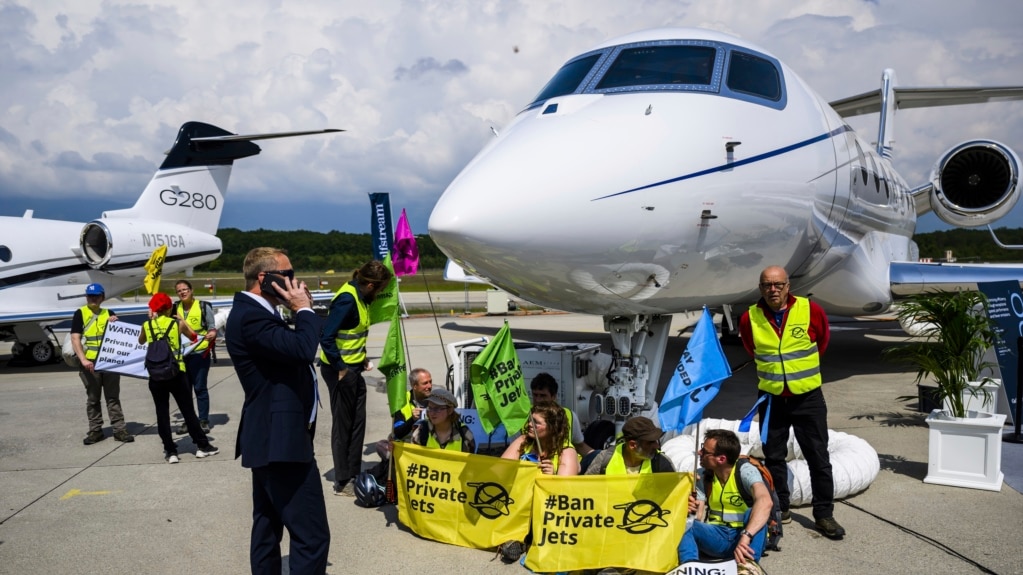Climate activists have spray painted a boat, blocked private planes from taking off and covered holes in golf courses over the summer.
These actions are part of a campaign against the lifestyles of very rich people who, the activists say, release a lot of carbon pollution into the atmosphere.
As flooding, storms, and wildfires take place around the world, climate activists have also turned to new measures to call attention to these bad weather events. Some activists glued themselves to a road in Germany. Others threw soup on a Vincent van Gogh painting in Britain. They caused delays in sporting events including a Formula One Grand Prix racecar competition and the Tour de France bicycle race.
Now, they are turning their attention to rich people after targeting oil and gas companies and businesses that invest in fossil fuels.
“We do not point the finger at the people but at their lifestyle, the injustice it represents,” said Karen Killeen. She was protesting in Ibiza, Spain, a popular summer place for the wealthy.
Killeen and other climate activists spray painted a $300 million boat while holding up a sign that read, “You consume, others suffer.” She said she was protesting unnecessary carbon releases such as superrich individuals picking up food by boat. “In a climate emergency, it’s an atrocity,” she said.
In Switzerland, about 100 activists chained themselves to aircraft stairs and to an entrance at Europe’s biggest private jet sales gathering in Geneva. Another group of activists spray painted a private jet on the island of Sylt in the North Sea. In Spain, activists plugged holes in golf courses to protest the sport’s heavy water needs during hot, dry weather.
In the United States, Abigail Disney of the Disney family was arrested at East Hampton Town Airport in New York, in July along with 13 other protesters. They blocked cars from entering or leaving a parking area. The group also protested at a golf course, a museum event, and outside private homes.
“Luxury practices are disproportionately contributing to the climate crisis at this point,” said American University social scientist Dana Fisher.
In a 2021 report, the nonprofit organization Oxfam said the richest one percent of people would be responsible for around 16 percent of emissions by 2030.
Richard Wilk is an economic anthropologist at Indiana University. He criticized superyachts: large boats that come with a crew, a helicopter, submarines and swimming pools. Wilk said superyachts release about 6,400 metric tons of carbon dioxide a year. That is over 1,500 times more than a family car, he said.
The environmental group Greenpeace estimated that private aircraft caused about 3 million metric tons of carbon pollution in Europe alone. That is the same as the average yearly CO2 emissions of over half a million people in the European Union.
But University of Pennsylvania climate scientist Michael Mann warned not to take attention away from fossil fuel companies. “The solution is to get everyone to use less carbon-based energy,” whether wealthy or lower-income people, he said.
David Gitman is president of Monarch Air Group, a private airline in Florida. He urged activists to think about whether their actions would bring real change “like sustainable aviation fuel, like carbon offsets.”
Gitman added, “Now, if they go out and they spray-paint a private jet in an airport in Europe, is that going to get those results? In my opinion, no.”
But as protests increase, Wilk said they could still bring changes in behavior.
“Public shaming is one of the most powerful ways of controlling people,” Wilk said. “It acts in a lot of different ways to embarrass people, to make them more conscious of the consequences of their actions.”
I’m Caty Weaver.

